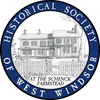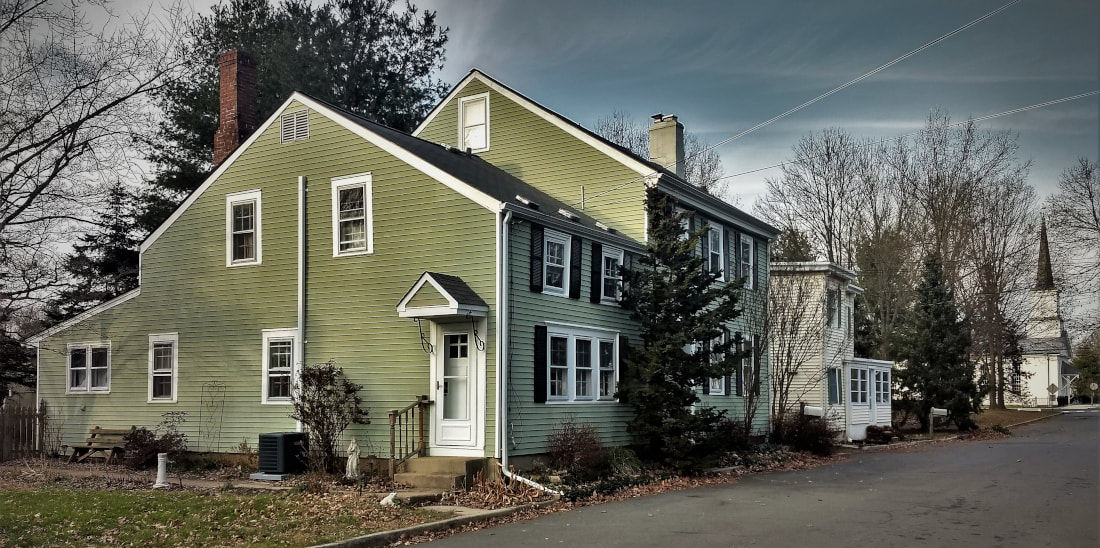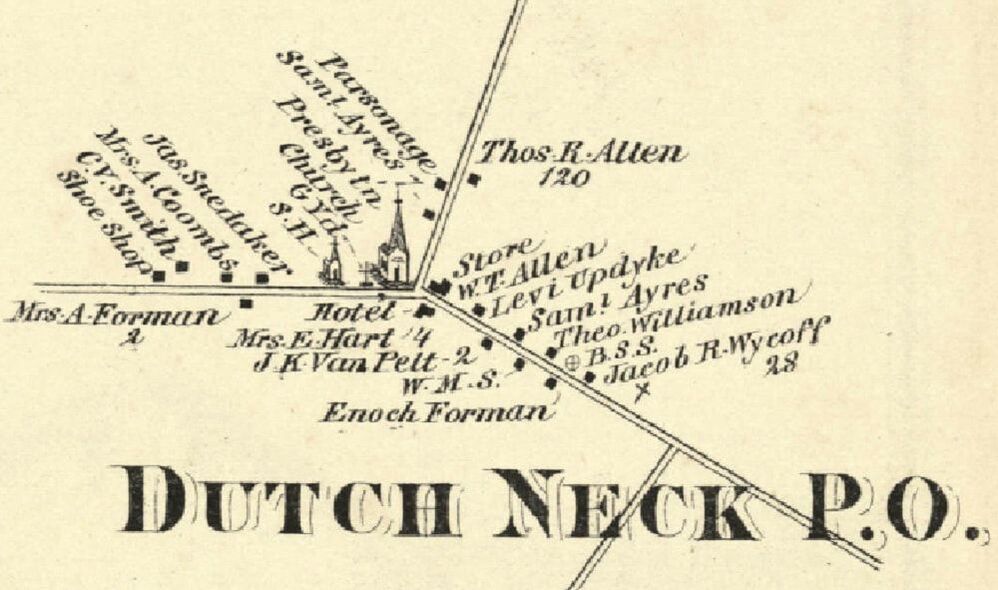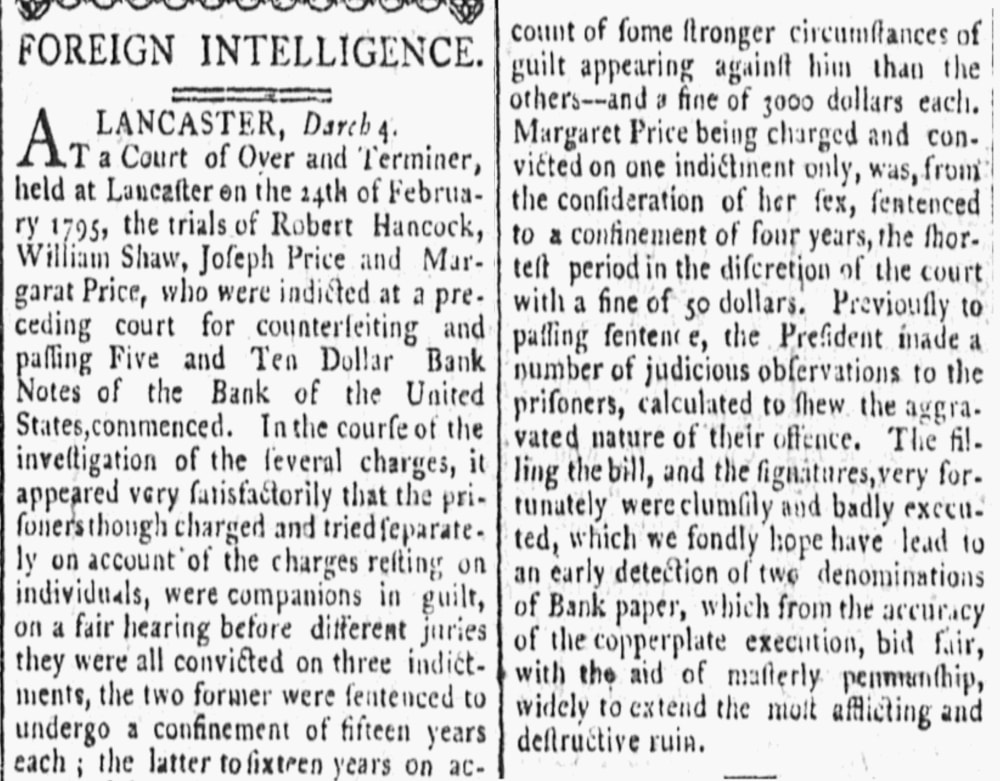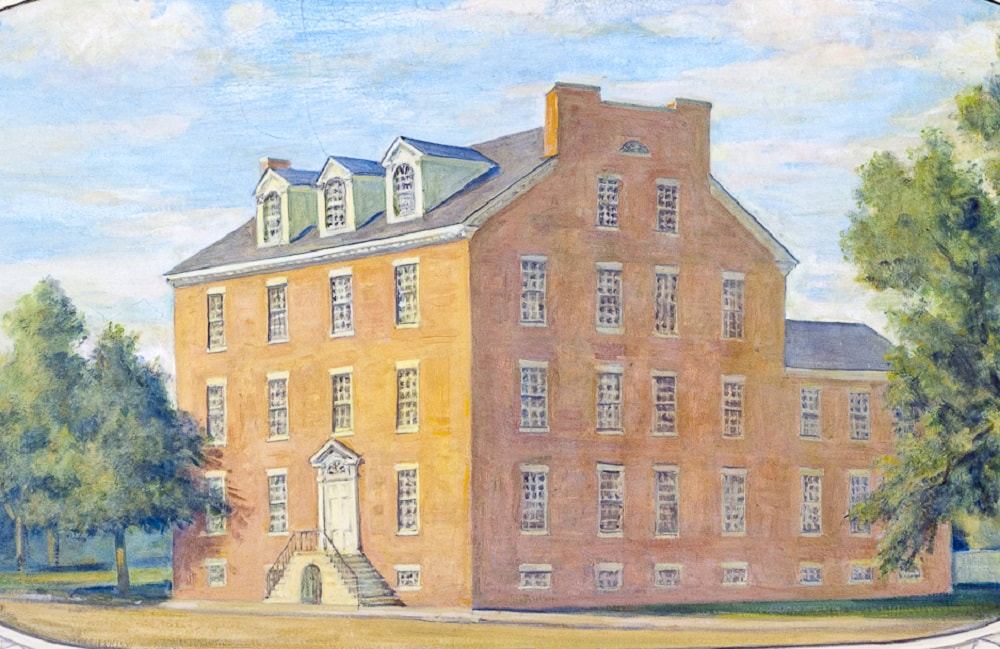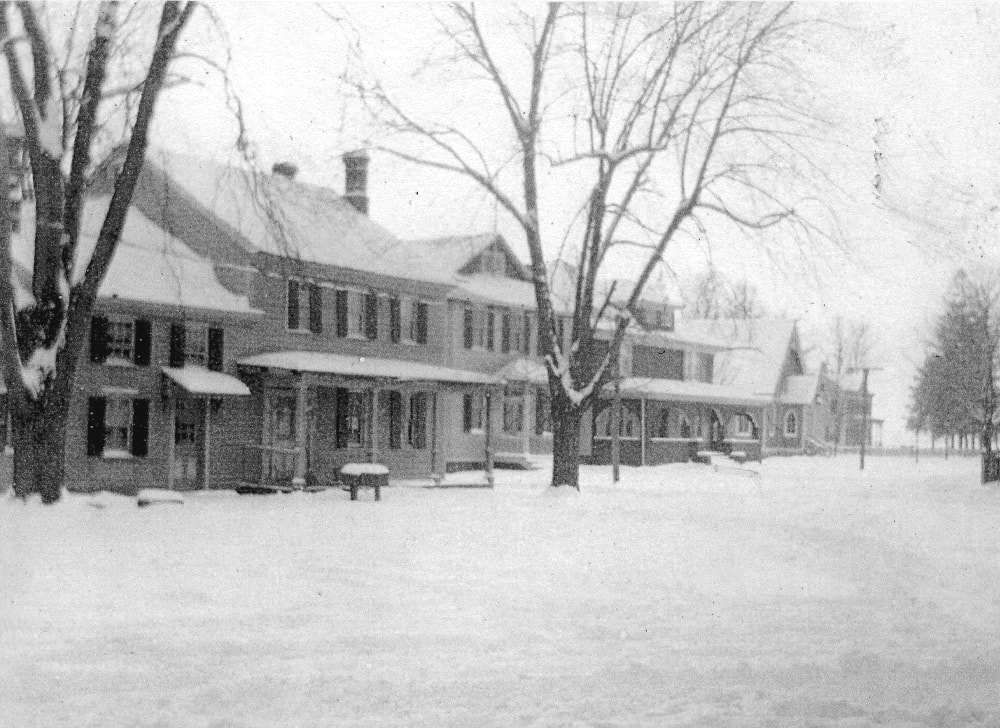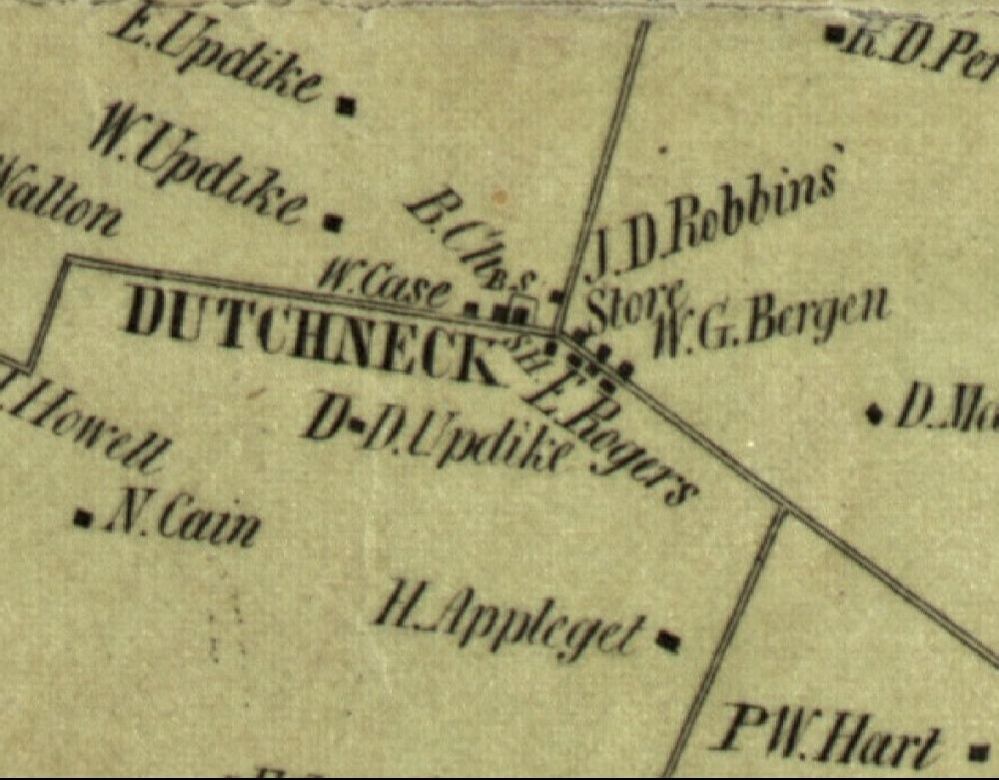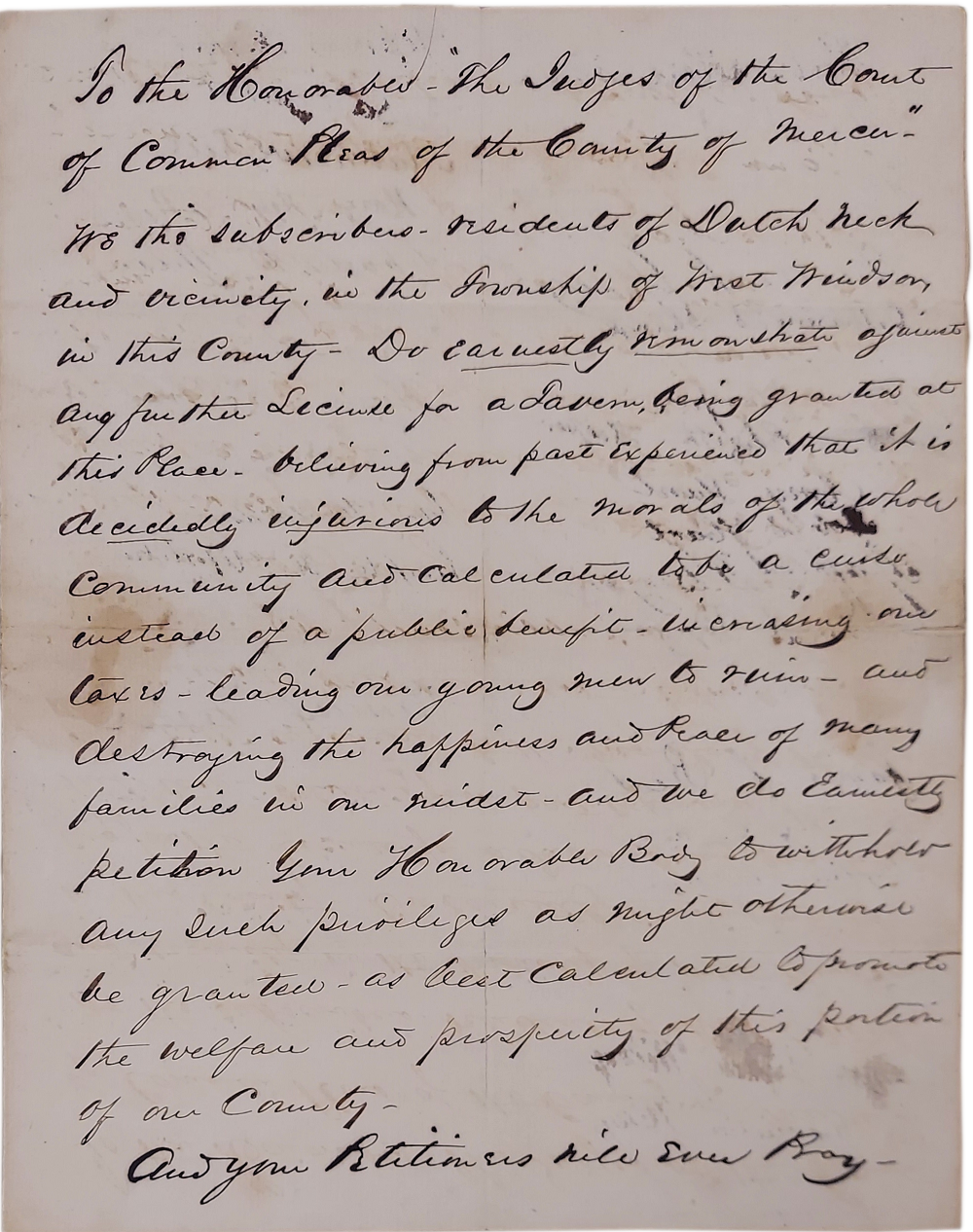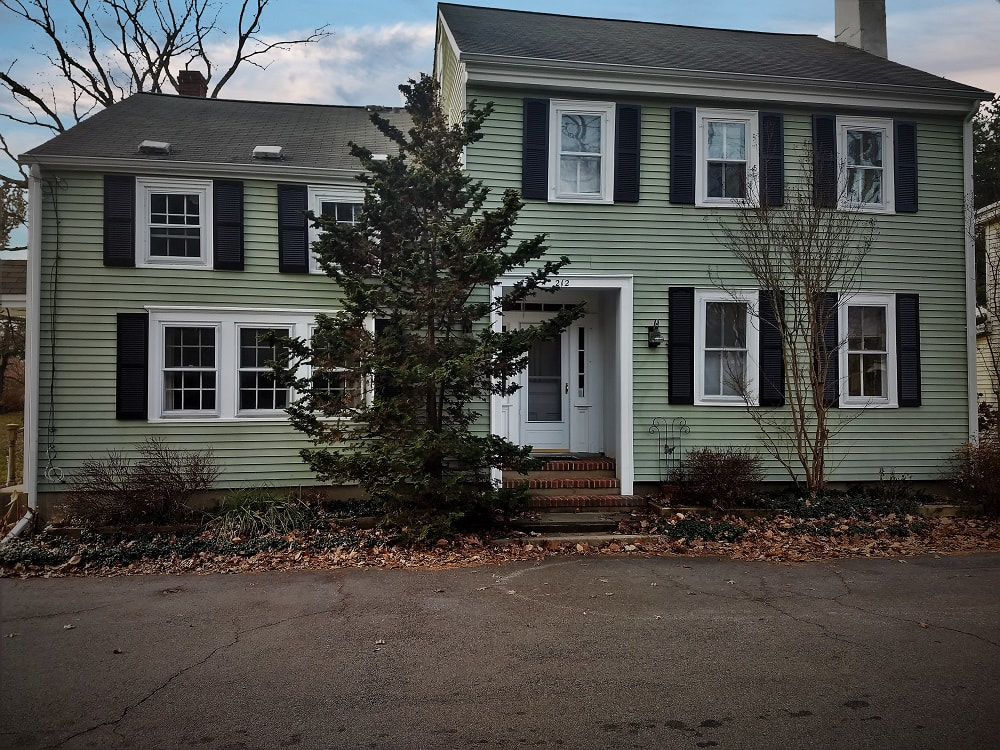Dutch Neck Inn - West Windsor's First Town Hall
Tucked away at 212-214 South Mill Road is an old, 2-story house set close to the street. It may seem unassuming amid the other old buildings (and fellow "100 Club" members) of the historic West Windsor community of Dutch Neck. However, it is in fact one of our town's most historically significant structures. This is the former Dutch Neck Inn - an integral part of that community and West Windsor's very first "Town Hall," where its first government formed in 1797.
In 2023, Paul Ligeti - then President of the Historical Society - presented on the Dutch Neck Inn's history. Click here to watch the recording.
In 2023, Paul Ligeti - then President of the Historical Society - presented on the Dutch Neck Inn's history. Click here to watch the recording.
Historical Overview
|
This building was originally located about 300 feet north, where the dead-end stub of South Mill Road meets Village Road West, next to the World War II memorial.[1] Although tax records claim it was constructed in 1790,[2] it may very well be older. Indeed, a tavern license from 1784 shows an "Elisha Cook" successfully requesting permission to establish a tavern here at the crossroads next to the "Neck Meeting House" (the predecessor to the Dutch Neck Presbyterian Church).[3] The location was convenient, partly due to its centrality along an older route linking Allentown to Princeton.[4]
|
Debts and Counterfeits
|
Elisha owned the inn until 1786 or 1787, after which it passed to John Voorhees.[5] However, by 1794, John was no longer the proprietor. That year, three men named Robert Hancock, William Shaw, and John Harper were in possession of the property - but not for long. Due to significant debts they owed, the Sheriff of Middlesex County seized the property and auctioned it off in September 1795 to compensate their debtee. The buyers were Jacob G. Bergen and Joseph Story.[6]
However, Robert Hancock and William Shaw were in a lot more trouble. In 1794, they were apprehended in Lancaster, PA under charges of running a counterfeiting scheme. Robert had apparently visited his homeland of England and returned with bank notes that could be altered to mimic American currency, and the group circulated the money. It's unknown if any of this activity took place in Dutch Neck. The United States hadn't fully standardized its currency and its economy was vulnerable to instability, so counterfeiting was deemed a heinous crime. Most co-conspirators were sentenced to fifteen to sixteen years in prison and fined $300 each. On the way to interrogation, Robert was even found carrying counterfeit bills![7] |
A Patriot and The Continental Congress
|
Although the tale of Joseph Story runs cold (research is ongoing), Jacob G. Bergen's tale is quite the opposite of his three debtor predecessors. Jacob was born in 1745 in Windsor Township (West Windsor's predecessor).[8] In the 1770s, he bought the grist mill around which historic West Windsor community of Grovers Mill grew.[9],[10] Six years later, Jacob was a Lieutenant in the Somerset County militia.[11] The same decade, he ran an inn in Princeton called “The Confederation."[12] He must have been popular, for in 1788, locals planned (but didn’t succeed) to have the village of Princeton secede from Windsor and Montgomery Townships and begin government meetings in Bergen’s Princeton inn.[13] Jacob also owned other taverns in Philadelphia and Trenton as well.[14] Notable was the the “French Arms” tavern – at the time, Trenton’s biggest building. In October 1784, Jacob signed a lease with the United States Continental Congress who used the structure as the ninth capital building of the United States. The Congress met there in late 1784 and even hosted the Marquis de Lafayette before he returned to France.[15]
|
West Windsor's First Meeting
|
It's assumed that Jacob moved to the Dutch Neck area - where the rest of his family and that of his wife (Elizabeth Covenhoven) lived - around the time he placed the successful auction bid for the Dutch Neck inn in 1795. Two years later, on February 9, 1797, Windsor Township split into East Windsor and West Windsor. It was also mandated that West Windsor hold its first meeting - to elect its first government - “at the house where Jacob Bergen now lives.”[16] Indeed, about two dozen men assembled at the Dutch Neck inn on April 8, 1797, and accomplished that very task.[17] You can learn more about this first meeting, and the offices established (some of which last to this day), by clicking here.
Taverns were often centers of social and political life in early America, and the newly-formed West Windsor was no different: for the next eleven years, virtually all government meetings would be held in Bergen's Dutch Neck inn.[18] Even through Jacob died in 1805 (he is buried in the Dutch Neck Presbyterian Church's graveyard) his wife Elizabeth kept the establishment - then called "Widow Bergen's Tavern" - for years to come. |
Subsequent Innkeepers
|
Although Elizabeth did not sell the building for many more years after Jacob's death, others ran the inn for much of this time, and often hosted town meetings there. Recorded innkeepers include:
|
Other Owners and the Anti-Inn-ers
|
In 1832, Elizabeth finally sold the property to Eli Rogers, ending over three dozen years of Bergen-Covenhoven ownership.[30] Eli would run the inn for the next twenty years, also hosting it as a popular venue for property auctions. In 1852, the inn passed out of Eli's hands when he sold it to a carpenter named Josiah Taylor and his wife, Rebecca Rogers.[31],[32] By this point, the inn had not been used as a West Windsor meeting location for a decade.[33] However, the building was still a political meeting ground, for Josiah hosted conventions for local Democratic voters there,[34] as well as meetings for the Mercer County Pursuing and Detecting Society (a group invested in recovering stolen goods and livestock).[35] Joseph was also a West Windsor Overseer of the Highways, Poundkeeper, and Constable for much of the 1850s-80s.[36]
In 1861, Josiah sold the property to Enoch and Lucinda Hart.[37] Like his predecessors, Enoch served in local government, as Poundkeeper from 1861-63.[38] However, presumably unlike those innkeepers before him, he - and the presence of the Dutch Neck inn in general - may have been less than popular with neighbors. Shortly before applying for his initial tavern license in 1861, a petition signed by thirty-one locals was sent to the Mercer County Court of Common Pleas, urging them to reject his application, under the premise that he was not "qualified to keep a tavern either (in Dutch Neck) nor anywhere else, nor is a public house of any kind needed there."[39] A subsequent petition warned that "it is decidedly injurious to the morals of the whole community and calculated to be a curse instead of a public benefit - increasing our taxes - leading our young men to ruin - and destroying the happiness and peace of many families in our midst."[40] Likely in response, in 1862, Enoch's tavern license application included far more than the usual dozen or so neighbors in support of him. Rather, 145 people - almost ten percent of West Windsor Township's entire population - signed his application testifying to the need for a tavern and Enoch's qualifications as a "fit and proper person."[41] |
Legacy
|
Enoch's tactic may have been convincing, for Hart continued submitting tavern license requests until 1869.[42] The next known - and final - tavernkeeper was Jonathan Griggs (Poundkeeper from 1880-82; Constable from 1881-83),[43] in the 1870s and possibly early 1880s.[44] However, a property inheritance dispute that lasted a few years in the 1870s resulted in the property being subdivided, and the tavern shut down in or around 1879 or 1880.[45] Thereafter, it never again functioned as an inn.
In 1912, the inn acquired a neighbor when, after 115 years of meeting in houses and inns, West Windsor's government finally built a dedicated "Town Hall" directly next door.[46] You can read more about that building here; it was razed in 1977[47] and in its place stands West Windsor's World War II memorial. Some time between 1912 and 1930, the old Dutch Neck tavern was moved about 300 feet south to its current position at 212-214 South Mill Road.[48],[49] Generations of residents have made extensive interior renovations, but some original elements - such as pumpkin pine flooring - remain.[50] The building remains one of the most historically-significant landmarks of West Windsor, surrounded by one of the town's most historic communities: Dutch Neck. |
Bibliography
- “West Windsor Township.” Map. 1875 Historical Atlas of Mercer County, New Jersey - Map of West Windsor. Philadelphia, PA: Everts & Stuart, 1875. https://www. loc.gov/item/2010587333/. This shows Dinky Line stops in Princeton Junction and Penns Neck (where the line intersects Route 1).
- “West Windsor Tax Assessor Address List, 2019.” West Windsor, 2019. List of all residences in West Windsor with dates of construction, according to tax assessor. Sent to the Historical Society by Lorraine Jones and Dawn Moretti. For this specific citation, look at "212-214 S Mill Rd."
- Cook, Elisha. Ms. Tavern License Request. Windsor, 1784. Request to the Court of Quarter Sessions - April session - that Elisha Cook “may obtain license for keeping tavern at the Neck Meeting House in the Township of Windsor County of Middlesex - March 15, 1784."
- "Middlesex County Public Road Surveys, 1720-1775 (Microfilm).” Trenton, n.d. Accessed February 28, 2022. From the New Jersey State Archive’s Microfilm room. Reel: Middlesex County Deeds and Land Conveyances, 1714-1722; Public Road Surveys, 1720-1775.
- Voorhees, John. Ms. Tavern License Request. Windsor, 1788. Request to the Court of Quarter Sessions - April Session - that John Voorhees maintain an inn in Dutch Neck formerly kept by Elisha Cook - March 20, 1788.
- Bergen, Jacob G., Marsalis, John, Story, Joseph, Jacob, Maple, Elizabeth. “Indenture.” Windsor, 1795. Deed from for the Dutch Neck Inn property at the intersection of South Mill Road and Village Roads East/West. Located in the New Jersey State Archives, Middlesex County Deed Book 5 Page 118.
- “FOREIGN INTELLIGENCE.” Greenleaf's New York Journal and Patriotic Register. March 18, 1795.
- Dutch Neck Presbyterian Church. (n.d.). Dutch Neck Presbyterian Church graveyard. West Windsor. Dutch Neck Presbyterian Church graveyard gravestones, which often list birth dates, death dates, and ages of those buried there - including those of many of West Windsor's oldest families.
- Wright, Mahlon. “Notice.” Pennsylvania Gazette. October 25, 1764. Mahlon Wright listing the Grovers Mill tract for sale - October 25, 1764
- Bergen, Jacob G. “To be SOLD.” New York Gazette and Weekly Mercury. August 22, 1774. Jacob G. Bergen listing the Grovers Mill tract for sale - August 22, 1774
- Dobbett, Frederick Burford. Ms. The New Jersey Society of the Sons of the American Revolution - Application for Membership, 1922. Membership application for Frederick Burford Cobbett - great-great grandson of Jacob G. Bergen, who is listed as a Lieutenant in Somerset and Princeton. Examined and approved in 1922. National Number: 37355. State Number: 2708.
- Bergen, Jacob. Ms. Tavern License Request. Windsor, 1784. Request to the Court of Common Please - January session - that Jacob G. Bergen keep an inn at the "Sign of the Confederation" - 1780.
- “Petition of the Inhabitants of Princeton to the Legislative Council and General Assembly Concerning the Incorporation of the Town.” Trenton, NJ: New Jersey State Archives, November 24, 1788. Located in NJ State Archives - Petitions and Other Papers relating to Establishment of Municipalities and Municipal Boundaries, 1748-1859, Series # SLE000001, Item #5.
- Bergen, Jacob G. New Jersey Gazette. April 30, 1783.
- “French Arms Tavern, Trenton Nov. 1—Dec. 24, 1784.” Office of the Historian - Buildings of the Department of State. U.S. Department of State. Accessed January 15, 2023. https://history.state.gov/departmenthistory/buildings/section10.
- "An Act for Dividing the Township of Windsor in the County of Middlesex into Two Separate Townships.” New Jersey State Archives, 1797. February 9, 1797. This split Windsor Township into West Windsor and East Windsor.
- Ms. West Windsor Township Meeting Minutes - April 8, 1797. West Windsor, 1797. West Windsor Township’s first township meeting - held at the house of Jacob G. Bergen on April 8, 1797 and involved the election of West Windsor’s first town officers. Minutes located in the Municipal Center.
- "West Windsor Township Meeting Minutes, 1797-2012.,” n.d. Original Township Committee meeting minute database located in the Municipal Center. Minutes collectively tell of the roles of various township officers as well as town development. Several thousand pages.
- New Jersey State Archives Manuscript Room - Middlesex County Tavern Licenses, 1758-1826.
- Ibid.
- Ibid.
- Ibid.
- "West Windsor Township Meeting Minutes, 1797-2012.,” n.d. Original Township Committee meeting minute database located in the Municipal Center. Minutes collectively tell of the roles of various township officers as well as town development. Several thousand pages.
- New Jersey State Archives Manuscript Room - Middlesex County Tavern Licenses, 1758-1826.
- "West Windsor Township Meeting Minutes, 1797-2012.,” n.d. Original Township Committee meeting minute database located in the Municipal Center. Minutes collectively tell of the roles of various township officers as well as town development. Several thousand pages.
- New Jersey State Archives Manuscript Room - Middlesex County Tavern Licenses, 1758-1826.
- "West Windsor Township Meeting Minutes, 1797-2012.,” n.d. Original Township Committee meeting minute database located in the Municipal Center. Minutes collectively tell of the roles of various township officers as well as town development. Several thousand pages.
- New Jersey State Archives Manuscript Room - Middlesex County Tavern Licenses, 1758-1826.
- "West Windsor Township Meeting Minutes, 1797-2012.,” n.d. Original Township Committee meeting minute database located in the Municipal Center. Minutes collectively tell of the roles of various township officers as well as town development. Several thousand pages.
- Covenhoven, Elizabeth, Rogers, Eli. “Indenture.” West Windsor, 1832. Deed from for the Dutch Neck Inn property at the intersection of South Mill Road and Village Roads East/West. Located in the New Jersey State Archives, Middlesex County Deed Book 24 Page 617.
- Rogers, Eli, Taylor, Josiah. “Indenture.” West Windsor, 1852. Deed from for the Dutch Neck Inn property at the intersection of South Mill Road and Village Roads East/West. Located in the New Jersey State Archives, Mercer County Deed Book W Page 210.
- “United States Census, 1860 - West Windsor Township.” West Windsor Township, 1860.
- "West Windsor Township Meeting Minutes, 1797-2012.,” n.d. Original Township Committee meeting minute database located in the Municipal Center. Minutes collectively tell of the roles of various township officers as well as town development. Several thousand pages.
- Wooley, Samuel. “Third Assembly District Convention.” Daily True American. October 16, 1858.
- Coleman, James B. “NOTICE.” Daily True American. November 10, 1854.
- "West Windsor Township Meeting Minutes, 1797-2012.,” n.d. Original Township Committee meeting minute database located in the Municipal Center. Minutes collectively tell of the roles of various township officers as well as town development. Several thousand pages.
- Hart, Enoch, Taylor, Josiah. “Indenture.” West Windsor, 1861. Deed from for the Dutch Neck Inn property at the intersection of South Mill Road and Village Roads East/West. Located in the New Jersey State Archives, Mercer County Deed Book 50 Page 111.
- "West Windsor Township Meeting Minutes, 1797-2012.,” n.d. Original Township Committee meeting minute database located in the Municipal Center. Minutes collectively tell of the roles of various township officers as well as town development. Several thousand pages.
- New Jersey State Archives Manuscript Room - Mercer County - Court of Common Please - Applications for Tavern Licenses, 1840-1881.
- Ibid.
- Ibid.
- Ibid.
- "West Windsor Township Meeting Minutes, 1797-2012.,” n.d. Original Township Committee meeting minute database located in the Municipal Center. Minutes collectively tell of the roles of various township officers as well as town development. Several thousand pages.
- New Jersey State Archives Manuscript Room - Mercer County - Court of Common Please - Applications for Tavern Licenses, 1840-1881.
- George M. Hart Et. Al. vs. Mary A. Bowers Et. Al. (New Jersey State Archives - Manuscript Room May 15, 1879).
- Ms. West Windsor Township Meeting Minutes - December 31, 1912. West Windsor, 1912. West Windsor Township Committee meeting minutes show the Commitee beginning to meet at the building on this date. Minutes located in the Municipal Center.
- "West Windsor Township Meeting Minutes, 1797-2012.,” n.d. Original Township Committee meeting minute database located in the Municipal Center. For this citation, look for the year 1977.
- View down Village Road West - from Danser Family. Photograph. West Windsor, n.d. West Windsor History Museum. Donated by the Danser family. Shows the old Bergen inn sitting next to the old Town Hall, which West Windsor Township Committee meeting minutes shows was built in 1912. This demonstrates that the old inn still existed at its original location at least as recently as 1912, if not more recently.
- "ESRI ArcGIS Map Viewer - NJ 1930 Black & White Imagery,” n.d. Online interactive map viewer published by ESRI. One layer shows NJ 1930 black & white imagery - including in West Windsor. Accessed via the url: https://www.arcgis.com/apps/mapviewer/index.html?layers=4e7de8d868c248f99c3fddc5bf8c0386. Interactive map shows that the old Bergen/Dutch Neck inn had been relocated to its present position at 212-214 South Mill Road by 1930.
- Pumpkin Pine Flooring within 212-214 South Mill Road. Taken by Cynthia Yoder. January 7, 2021. Photograph.
